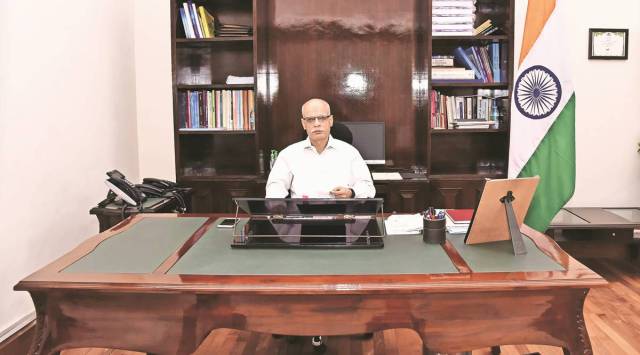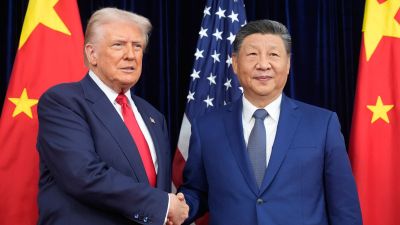The government is working towards expanding the tax base as 75 per cent of the total individual tax returns show income below Rs 5 lakh, said Revenue Secretary Tarun Bajaj. In an interview with Aanchal Magazine and Sunny Verma, he also said the regulatory concerns on virtual digital assets should be addressed by legislation. Edited excerpts:

What happened was that last year was very good. First quarter was a washout, people didn’t pay taxes, the second quarter was also not good, third was better and fourth was best. So we don’t anticipate the same growth as much as it happened in the earlier quarters, so it is in that context that we have kept this figure. I think we should be around that. It may be more than Rs 10,000-20,000 crore more than the RE.
Story continues below this ad
For next year, the targets…
For next year, if you take out the excise duty, then the increase is 14 per cent which is a good increase. We have actually not been achieving a buoyancy of 1 for the past few years so in this case though they have said that the nominal GDP will grow by 11 per cent, even if it grows a little more, so 14 per cent is a good target. The base is going to be much bigger this year because the growth this year is going to be much larger.
If you include excise duty, then buoyancy factor won’t be 1
If you include excise, it is almost 1. But one should not take excise duty into account, it’s not even related to the GDP. It’s consumption led, if consumption increases as compared to this year to that extent maybe 2-3 per cent, not more than that. We have also reduced the excise duty. So if you take the effect of that actually there is a 15 per cent reduction in excise duty.
Story continues below this ad
What is the hit that came from reduction in excise duty and customs duty on edible oil?
For excise duty, we have taken a hit of about Rs 50,000-60,000 crore and for customs duty it was overall Rs 18,000-20,000 crore.
On crypto, the tax aspect is different and regulatory side is different. From the perspective of smaller investors, this is now expanding, there is marketing of coins. Will it not lead to mis-selling? Now it might be seen as the government is taking tax for it.
That becomes a more regulatory issue. That is then a regulatory issue or a consumer protection issue. But if we had not taxed it…now people will say because it has been taxed, it is legal?
Story continues below this ad
That’s how it will get sold, that’s the issue
So let’s hope they’ll come up with a Bill sooner than later. So if they come up with a Bill then it will be regulated and will keep the interest of the investor in mind. But the role of the Revenue Department is very limited in the sense that we are just saying that if you’re making money in this product, please pay your taxes.
We have seen a lot of instances of fake input tax credit bills. Government has also been taking action. The GST system has been there for many years and it has stabilised. Is there any system or strategy where it doesn’t happen? Have you brainstormed on it?
We have brainstormed, we are using IT, we are using artificial intelligence but how do you do it? If I issue you a (fake) bill, and you are willing to accept it. Then? How will you stop it?
Story continues below this ad
The honest taxpayers are also getting affected with the ITC restrictions.
How is the taxpayer honest if there is no movement of goods, but only movement of bills.
Conditions are going to be there to avail input tax credit
Conditions will be put in now. Those are enabling provisions (in the Finance Bill). It is there since say, a spike comes in the first month by showing a turnover of Rs 50 crore. We noticed in our analysis that in the second month that person is not there. There would be no imprint in income tax. So we can create those kind of things. But if somebody shows this kind of a spike, we will keep a check on him.
Story continues below this ad
How has the new taxation regime performed?
For individuals, we are yet to analyse data since this is the first year. It is fine for corporates. In 2019-20, 65 per cent of income and 16 per cent of assesses have moved here. So every year numbers would go up. As and when their sunset clause comes in, they will keep moving to the new regime. The tax rate that we are getting from corporates is about 22 per cent on an average, which was 27-28 per cent before the reduction.
For individuals?
We will do the analysis. But my anticipation is that those whose income is lower, they will not come to the new regime. For higher income, if you are not taking exemptions, then you will come. Of the returns that we have analysed in 2019-20, 75 per cent of the returns are below Rs 5 lakh income and 92 per cent are below Rs 10 lakh income.
So then how do you expand the tax base?
Story continues below this ad
We are doing it. From the TDS side. 7 crore people file returns but 11 crore people pay taxes. 4 crore don’t come because their TDS may have been deducted. We have brought in a clause that if your TDS is more than Rs 50,000 and you have not filed return, we would wait for two years and if return wouldn’t be filed, then levy double TDS. Now that time period has been reduced to one year. Also, we have so much information. Because of that we have brought in the updated tax return clause. We can now show you information, you will file the return before the tax department raises any question.
Is that tax return filing window an amnesty scheme?
No. You may have genuinely done some mistake. So that gives you a chance to correct it. And you get two years to do it.
And pay tax for it
Otherwise, I’ll also not pay tax. Otherwise I’ll just say I’ll pay tax after two years. The risk is that the tax department is also watching. So if you do not pay tax and wait, then there may be a chance of the department catching you before that.

































